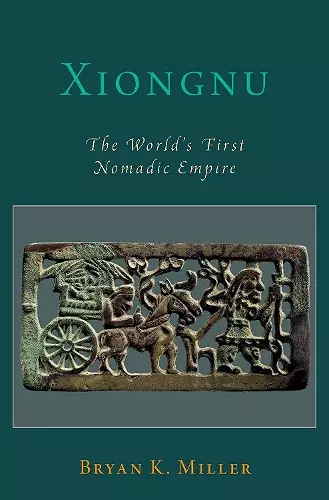Xiongnu
The World's First Nomadic Empire
Format:Hardback
Publisher:Oxford University Press Inc
Published:18th Dec '24
Currently unavailable, and unfortunately no date known when it will be back

This book raises the case of the world's first nomadic empire, the Xiongnu, as a prime example of the sophisticated developments and powerful influence of nomadic regimes. Launching from a reconceptualization of the social and economic institutions of mobile pastoralists, the collective chapters trace the course of the Xiongnu Empire from before its initial rise, traversing the wars that challenged it and the reformations that made it stronger, to the legacy left after its eventual fall. Xiongnu expounds the economic practices and social conventions of steppe herders as fertile foundations for institutions and infrastructure of empire, and renders a model of “empires of mobilities,” which engaged the control less of towns and territories and more of the movements of communities and capital to fuel their regimes. By weaving together archaeological examinations with historical investigations, Bryan K. Miller presents a more complex and nuanced narrative of how an empire based firmly in the steppe over two thousand years ago managed to formulate a robust political economy and a complex political matrix that capitalized on mobilities and alternative forms of political participation, and allowed the Xiongnu to dominate vast realms of central Eurasia and leave lasting geopolitical effects on the many worlds around them.
Bryan Miller offers an intriguing and much needed treatment of eastern Eurasian history and archaeology that brings to light the latest excavation results from Mongolia, Siberia, and northern China, and articulates these discoveries expertly with the ancient historical texts on the Xiongnu nomadic state. With engaging insight and new interpretations, Miller reveals the power of Mongolian archaeology to transform our conventional understandings of nomadic peoples and their pivotal role in the making of East Asia. * William Honeychurch, Yale University *
Miller brilliantly interweaves Chinese primary sources and Mongolian, Russian, and Chinese archaeological research to liberate Xiongnu history from dualistic relations with Han Dynasty China. In Miller's re-envisioning, Xiongnu authority extended over diverse regional pastoral and agricultural societies across Eurasian steppe and desert, and the Xiongnu and Han were only two players in a multilateral 'Great Game' that encouraged far-flung political, economic, and cultural conflicts and exchanges well into the first century CE. The most pathbreaking book on Xiongnu history since Nicola Di Cosmo's Ancient China and Its Enemies. * Jonathan Karam Skaff, Shippensburg University *
Comprehensive and wide-reaching, Xiongnu explores the rise of the empire, details how the empire controlled nodes of wealth and far-flung power bases, and charts the slow and fractured decline of the Xiongnu empire. Throughout, Miller provides fascinating readings of burial goods, vibrant tellings of oath ceremonies, and careful interpretations of Chinese letters and histories. Xiongnu firmly brings its nomad protagonists onto center stage and into sharp focus, and this book is bound to appeal to those interested in archaeology, nomadic societies, and world history. * New Books Network *
ISBN: 9780190083694
Dimensions: 168mm x 163mm x 25mm
Weight: 703g
384 pages